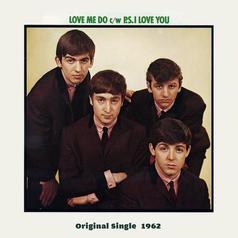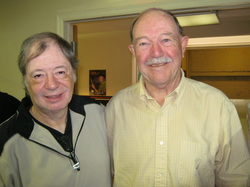
"He Played it." "No, he didn't and I have proof." "Oh Yeah!" These words can be exchanged in any sports bar on game night. These words are often spoken by musicians when arguing about who played what and when.
We are no different than our sports brethren when we argue, and there is no music argument better than the "Love Me Do" controversy. In a way it has become a fable rather than a story of how the music business works.
I've revived this argument because I can now provide audio samples that feature each of the drummers involved. The performances of Pete Best, Ringo Starr and session drummer Andy White along with Ringo on Tambourine, are presented in the order they were recorded. You can decide which version you like and to be free to present your opinion on this very blog.
We are no different than our sports brethren when we argue, and there is no music argument better than the "Love Me Do" controversy. In a way it has become a fable rather than a story of how the music business works.
I've revived this argument because I can now provide audio samples that feature each of the drummers involved. The performances of Pete Best, Ringo Starr and session drummer Andy White along with Ringo on Tambourine, are presented in the order they were recorded. You can decide which version you like and to be free to present your opinion on this very blog.
 Mike De Simone with Andy White (2011)
Mike De Simone with Andy White (2011) A fascinating sidebar greater than the drum argument is the fact that everybody screwed up. The band was raw and producer George Martin had little experience in recording a rock group. In my opinion, the only thing good about "Love Me Do" is that it was an original. Other than that I can find little in it that I Like. The demo session with Best was awful. I'm talking the whole band here. The tempo was too slow, the arrangement was terrible and they were clearly very nervous. Best certainly didn't help matters with his sloppy playing in the bridge but Martin was too quick to blame Best.
Martin told Beatles manager Brian Epstein that he would sign the group, but a session drummer would do the recording. Most likely, Pete Best was fired due to a growing dissatisfaction with his playing. Ringo Starr was hired without informing Martin that he would be playing on the next session. It's at this point where some context is necessary.
Producers to protect themselves will hire a known session player when faced with a musician they don't know. What is apparent is that the Beatles were in a difficult transition period and the recordings of "Love Me Do" bear that out. What is even more clear is that George Martin was in too big hurry to get something out. The song selection, arrangement and his failure to allow the group to get used to their new drummer are clear signs of his impatience.
Ringo's recording was certainly an upgrade not only rhythmically, but in terms of the arrangement. Ringo's version would become the single. George Martin and his assistant Ron Richards were still not satisfied so they engaged session drummer Andy White for another go at the tune.
The version with Andy White (drums) and Ringo (tambourine) was the last version done. It is also the one I prefer simply because the group was more comfortable and confident in the studio. What also makes this version better is that Ringo's tambourine mirrrors Andy White's back beat, creating a far better feel. The other aspect is the stronger bass drum hook up with McCartney. This version was released on the album "Please Please Me".
All fables have winners and losers. Unfortunately, Pete Best lost the most. He would receive financial compensation and another look at his work when the Beatles anthology was released. The other characters in our story would fare much better. Andy White would go on to play with many major artists.
Ringo Starr would remain a Beatle to the very end and became one of the best and most influential drummers in Rock. George Martin would earn a Knighthood for his brilliant and legendary work., And the Beatles? They were and still are a musical phenomenon whose influence pervades to this day.
Martin told Beatles manager Brian Epstein that he would sign the group, but a session drummer would do the recording. Most likely, Pete Best was fired due to a growing dissatisfaction with his playing. Ringo Starr was hired without informing Martin that he would be playing on the next session. It's at this point where some context is necessary.
Producers to protect themselves will hire a known session player when faced with a musician they don't know. What is apparent is that the Beatles were in a difficult transition period and the recordings of "Love Me Do" bear that out. What is even more clear is that George Martin was in too big hurry to get something out. The song selection, arrangement and his failure to allow the group to get used to their new drummer are clear signs of his impatience.
Ringo's recording was certainly an upgrade not only rhythmically, but in terms of the arrangement. Ringo's version would become the single. George Martin and his assistant Ron Richards were still not satisfied so they engaged session drummer Andy White for another go at the tune.
The version with Andy White (drums) and Ringo (tambourine) was the last version done. It is also the one I prefer simply because the group was more comfortable and confident in the studio. What also makes this version better is that Ringo's tambourine mirrrors Andy White's back beat, creating a far better feel. The other aspect is the stronger bass drum hook up with McCartney. This version was released on the album "Please Please Me".
All fables have winners and losers. Unfortunately, Pete Best lost the most. He would receive financial compensation and another look at his work when the Beatles anthology was released. The other characters in our story would fare much better. Andy White would go on to play with many major artists.
Ringo Starr would remain a Beatle to the very end and became one of the best and most influential drummers in Rock. George Martin would earn a Knighthood for his brilliant and legendary work., And the Beatles? They were and still are a musical phenomenon whose influence pervades to this day.
 RSS Feed
RSS Feed
